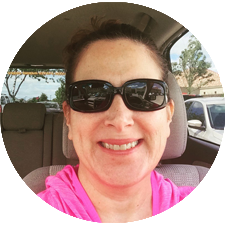
Mount Fuji2017
BLOGS

Leslie Perron
We Have Hope
June 26, 2017
In January 2013, I traveled to Phoenix to spend two weeks with my mom for a long overdue visit, my first since I had helped my brother move her into assisted living. We were both looking forward to the visit and I was hoping it would give my brother and sister-in-law a bit of respite. We spent the two weeks catching up, laying around her apartment, napping, running an occasional errand and of course a couple of medical appointments. Easy peasy, so I should have felt rested when I headed home. Instead, I was exhausted and out of breath again as I hustled through the airport after my flight, ready to get home. Three days later, I was so tired and could not get rid of constant nausea, so I made a doctor’s appointment, I knew something was wrong. After bloodwork and lots of discussion of why I might be anemic, my doctor referred me to a hematologist. The endless testing and waiting began, and on March 18th I received the news I pretty much knew was coming: multiple myeloma, a rare blood cancer.
I was somewhat prepared for this diagnosis because the husband of a dear friend of mine had this very same cancer. I happen to know a lot about it and talked to them several times during the month it took to be diagnosed. With all the similarities we shared, I would be lucky to not have it. I still considered myself blessed. I had been diagnosed with a rare cancer and I didn’t feel alone, I had someone in my life who had eight years of experience with this disease and they were able to recommend a great doctor for treatment and a second opinion. Several rounds of chemotherapy and a stem cell transplant later, I had a complete response to treatment.
The hardest part of being diagnosed was coming home to my 15-year-old son and telling him that I have cancer which isn’t curable (but it is very treatable), and that I was going to get very sick before I get better. Little did I know what “very sick” meant. I never felt like I wouldn’t get better, I was just in a hurry to get there. As anyone who has ever gone through cancer treatment knows, “better” is a relative term. For me, better was not being on any cancer medications, being here to see my son graduate high school and start college, being here to have my hair grow back – all of the little things that I live for now. The next big event in my son’s life is college graduation, this is his next accomplishment I must be here for, and it drives me to take care of myself.
Now I have this amazing opportunity to show myself and my son what it means to give back. The MMRF has been steadily working towards a cure for this cancer and in the past 10 years has helped develop 10 new drugs to fight cancer. Now I can be a part of that by raising money for research. The Moving Mountains for Multiple Myeloma program give 100 percent of the money raised to research, it just doesn’t get any better than that. The treks are designed to bring a group of people all touched by multiple myeloma together to work towards the common goal of raising funds and awareness.
Many years ago, I had the privilege of serving in the United States Marine Corps. During that time, I was stationed on Okinawa, Japan. Naturally, when I heard Mount Fuji was going to be on the list for the 2017 Moving Mountains for Multiple Myeloma program, I knew I had to apply. What a way to celebrate being four years post-transplant than to climb one of the most well-known mountains in the world. This will be my second climb of my life, the first taking place in May in New Hampshire. I am ready for this challenge; it will be hard, but I will summit Mount Fuji and watch the sunrise on July 20th. I will do this because I am lucky to have “minimum residual disease,” meaning there are a few cancer cells left, but there are no signs or symptoms of the disease. I will do this for all of those who cannot climb a mountain this year, to give them hope that a cure or at a minimum a new drug is right around the corner to give them a better quality of life. And I will do this for all of those who are no longer here, those who fought so hard to live. Sometimes hope is all we have. I hope to inspire all of those fighting cancer, the medical personnel who treat them, the researchers and collaborators who work to find a cure, and the people who find time to give to fundraisers like this that their money will help fund a cure.


